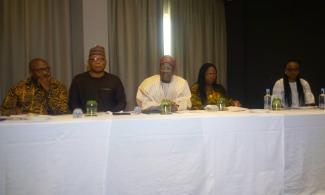
"We are telling Nigerians to do just two simple things before you share that information on Facebook, Twitter and WhatsApp, please ask yourself how credible the source. Two, don’t share any information which you cannot vouch for," he said.

Lai Mohammed, Minister of Information and Culture, has advised Nigerians not to share any news they cannot vouch for.
He stated this on Saturday at the inaugural lecture of the Guild of Professional Bloggers of Nigeria (GPBN), which held at Radission Blu, Ikeja, Lagos.
The lecture which was titled: 'Combating Fake News in the Cyberspace', saw in attendance Lai Mohammed, Prof. Abigail Ogwezzy Ndisika, Head of Department, Mass Communication, University of Lagos, Basil Udotai, an ICT lawyer, Kola Ologbodiyan, National Secretary of the Peoples Democratic Party, who was represented by Richard Ihediwa, among others.
Speaking at the event, Lai Mohammed expressed satisfaction that the title of the lecture was focusing on combating fake news, just as he noted that the Federal Government has consistently made efforts to create national awareness on the menace of fake news in the country.
He recalled the meeting he had with online publishers and social media influencers on July 24, where he said fake news is not limited to social media and is not new, but what is new is the way and manner that fake news is spreading.
His words: “The war against fake news is a must-win. As a multi-ethnic, multi-religious nation, Nigeria cannot afford an unbridled spread of fake news. This phenomena is exploiting our front lines to aggravate crisis in the country. Of course, you aware of a recent report by the BBC that says fake news circulating on social media is fuelling the farmer-herders clash in Nigeria. Gory pictures from other lands are circulated freely via Facebook, WhatsApp and Twitter, purportedly being from the killings in Benue and Plateau states.
"Let me repeat what I said at the launch of this campaign the Federal Government will not use cohesion or engage in censorship in order to fight the fake news epidemic. We believe there are enough laws in our books to fight this phenomenon. We, therefore, appeal to you and all Nigerians to join us in the fight against this scourge. We are telling Nigerians to do just two simple things before you share that information on Facebook, Twitter and WhatsApp, please ask yourself how credible the source. Two, don’t share any information which you cannot vouch for.”
Delivering his welcome address, Chris Kehinde Nwandu, the GPBN President, explained why the association was formed.
He said: “Many people come into blogging as journalists, while some simply because they are interested in writing and sharing information. However, one thing that is non-negotiable is the fact that the public must be fed with accurate and factual information and not the fabrication or falsehood called fake news. There was therefore the realisation that there was a vacuum which needed to be filled, and that is the need to have an umbrella body to regulate the activities of bloggers in the country.”
He called on government agencies to see to the registration of the association as they have made several attempts to register it with the Corporate Affairs Commission, but the efforts have been unsuccessful.
Also at speaking at the event, Kola Ologbodiyan, who was represented by Richard Ihediwa, said fake news has wrecked the lives of individuals and it has led people who cannot bear the weight of the allegation, commit suicide.
He said: “Fake news is a form of deceptive news report comprising of deliberate and outright falsehood with an intent to deceive and misled for political and financial gains. It can be to attract readership and traffic. The catch phrase today is breaking news and some breaking news can just end up breaking everything in sight,” he said.
While addressing the audience, Ihediwa took a swipe at the ruling party saying “Fake news escalated because of the activities of a particular party. This party deliberately promoted unsocial vice alongside hate speech and threat of violence as a tool to get political power during the run up to the 2015 election. That was the first time a political party will insult a sitting president directly, say unprintable things against a sitting president, make threats and say the nation will be ungovernable if power is not taken. APC and its officials became conveyors of fake news and what we are seeing now is an offshoot of its activities. Why this is important is because we are talking about source of fake news.”